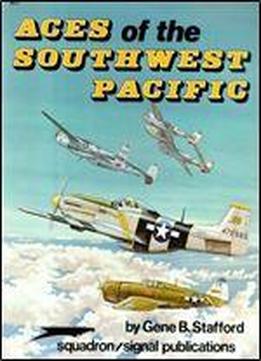
Aces Of The Southwest Pacific (squadron/signal Publications 6011)
by Gene B. Stafford /
1977 / English / PDF
31.5 MB Download
August 1945 — Japan's dream of conquest and empire was ended. The vision of an Asian Co-Prosperity Sphere which had seemed so bright in early 1941 now lay buried beneath the twisted rubble of the cities on the Home Islands, it lay rusting on the bottom of the vast Pacific Ocean, and it lay rotting in the unchartered jungles of a hundred scattered islands or the rain forests on the continent of Asia. From the first day of the war, the fighter pilots of the Army Air Force met the enemy in the skies. This book is concerned with a relatively small number of these men, the ones who by downing at least five enemy planes in the air qualified for the title "ace". It is, however, a tribute to the thousands of other men who served with the Air Force in the Pacific.
The airwar against Japan was truely vast in terms of the area involved. In the 45 months between Pearl Harbor and the cessation of hostilities, the ebb and flow of battle touched some 30 million square miles. This is equivalent to roughly one sixth the total surface of the earth. By way of comparison, the war against Germany was almost a local action.
The Eleventh Air Force carried on a short, cold and lonely war in the far north in response to the Japanese invastion of the Aleutians. Though actions were infrequent, a few of the pilots who served in this theater later went on to serve in other theaters. In the Far East, it was the American Volunteer Group and later the Tenth and Fourteenth Air Forces that carried the air war to the Japanese. The Tenth was based in India while the Fourteenth operated from China. The Central Pacific was the preserve of the Seventh and Twentieth Air Forces toward the end of the war as the noose drew tight around the Japanese Home Islands.











